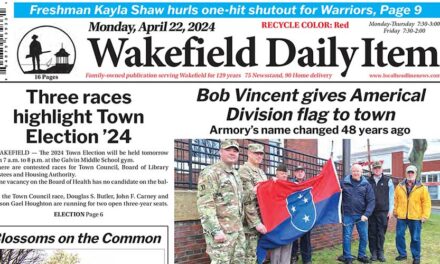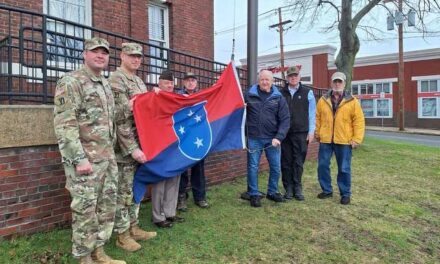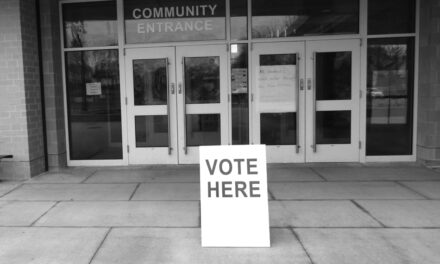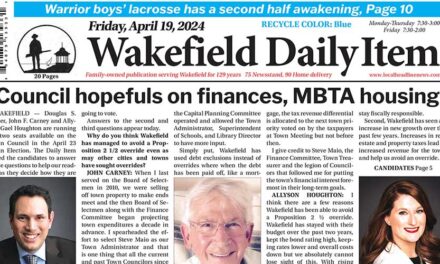Published in the November 17, 2015 edition.
By MARK SARDELLA
WAKEFIELD — Bed and Breakfast operations, including Airbnb, are currently illegal in residential districts in Wakefield and, after last night’s Town Meeting, there will be no mechanism by which a homeowner can legally run a B&B or Airbnb in any Wakefield residential district.
Article 9 on the Town Meeting warrant would have made bed and breakfast operations legal in Single Residence and General Residence districts by Special Permit. But as a zoning measure, a two-thirds majority would have been required for Article 9 to pass. A majority voted in favor of the article, 104-91. But the measure fell short of the 130 votes it needed to prevail.
Town Planner Paul Reavis introduced Article 9 by reminding voters that an article to legalize bed and breakfast operations in certain neighborhoods was defeated by Town Meeting in 2012.
Reavis argued that Airbnb is a form of B&B, which falls under the legal definition of a hotel. He said that under the current Zoning Bylaw, hotels are illegal in residential districts and that would include Airbnb operations. Article 9, he said, would provide an opportunity for appropriate B&Bs to be reviewed as part of the Special Permit process.
There was a concern, he said, that there were currently Airbnbs being operated in Wakefield without any oversight with regard to fire and safety codes.
Town Administrator Stephen P. Maio said at last week’s Planning Board hearing that if Article 9 did not pass, he would recommend that the town move to shut down any Airbnb operations that come to its attention.
John Lock of Gregory Road argued that Airbnb is a new innovation in travel and lodging and said that it was too early to take Wakefield out of the market. He maintained that local restaurants and other businesses benefit from people staying at local Airbnbs and if they were not allowed in Wakefield, other towns would get that business.
Douglas Butler of Main Street called restricting Airbnbs “overreaching” and “a serious trampling on our property rights.”
In response to a question from the floor, Town Counsel Thomas Mullen boiled down the issue under Article 9 to its essence.
“Airbnbs are currently not legal in Wakefield,” Mullen said. “If you want to legalize Airbnbs you would vote ‘yes.’ Under this article, you could go to the Zoning Board of Appeals and get a Special Permit. If you vote ‘no,’ the Building Inspector will not permit Airbnbs anywhere.”
Selectman Patrick Glynn insisted that by sponsoring Article 9, the selectmen were not trying to trample on anyone’s rights but were responding to complaints from neighborhoods where it has been abused.
Dan Dwyer of Plymouth Road favored Article 9 noting that B&Bs in Europe are heavily regulated businesses. He called requiring a Special Permit “a simple case of safety and preserving Single Residence neighborhoods.
Peter May of Garden Lane maintained that Airbnbs are
businesses.
“When you have rates posted online, it’s a business,” he said. “If you bought a home in a Single Residence district, it should stay that way.”
May said that no one should have to live next to a home being operated as an Airbnb, especially if they assumed that they were living next to a single family home. It changes the quality of life and safety of a neighborhood, he said.
“B&Bs are B&Bs,” he insisted. “Airbnb is just a delivery system.”
John Sofia of Whittemore Terrace opposed Article 9, calling it “a regulation that would protect the individual from himself by curtailing his freedoms.”
In response to questions from Laurie Hunt of Terrace Court, Police Chief Rick Smith said that he was unaware of any complaints that his department had received. Maio said that Town Hall had gotten three or four separate complaints about Airbnbs in residential neighborhoods.
Maio noted that Special Permits are required to run many types of business in a residential zone, including a law office. He said that there should be a process so that safety can be addressed and so that people who thought they moved into a single family neighborhood could be heard.
Deborah Fox of Alyssa Drive said that people who buy a home in a Single Residence district don’t want to discover that their neighbor is renting out rooms.
“Close them down now,” she said.
Lisa Reynolds of Salem Street agreed.
“If I wanted hotels and B&Bs in my neighborhood I would have moved into the city,” she said. “I chose residential because I wanted residential.”
Katy Farrell of Reynolds Road said that she would not want a home in her neighborhood to be “a revolving door of guests. It’s a business and should be done in a legitimate, regulated manner.”
Dana Burd of Yale Avenue wanted more specifics on the process someone would have to go through for a Special Permit. Reavis said that one would apply at the Building Department, get a list of abutters to notify from the Assessor’s Office and place a notice in the newspaper before appearing before the ZBA.
Bronwyn Della-Volpe of Cyrus Street argued that there should be more specific criteria for a Special Permit to operate a B&B. She maintained that the town was “overreaching” to solve “a minor problem.”
Town Meeting adjourned after Article 9. Moderator William Carroll announced that Town Meeting will resume up on Thursday starting at 7 p.m. in the Galvin Middle School’s Veterans Memorial Auditorium.




